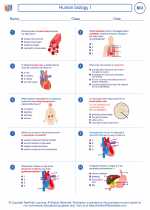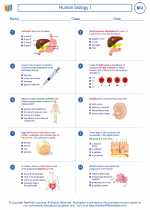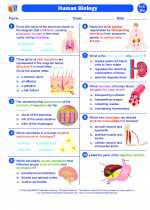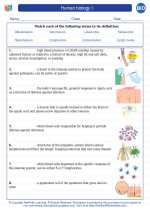Radiation in Biology
Radiation in biology refers to the emission and transmission of energy through space or a material medium. It can take various forms, including electromagnetic radiation (such as light and radio waves) and particle radiation (such as alpha and beta particles, and gamma rays).
Types of Radiation
- Electromagnetic radiation: This includes visible light, ultraviolet light, infrared radiation, microwaves, and radio waves. These forms of radiation are essential for processes like photosynthesis and vision in organisms.
- Particle radiation: This type of radiation involves the emission of subatomic particles such as alpha and beta particles, as well as gamma rays. These can have significant biological effects, particularly at high levels of exposure.
Biological Effects of Radiation
Radiation can have both beneficial and harmful effects on living organisms. In low to moderate doses, certain types of radiation, such as ultraviolet light, play a crucial role in processes like vitamin D synthesis and photosynthesis. However, high doses of ionizing radiation can damage cellular structures and DNA, leading to mutations and potentially causing cancer or other health issues.
Study Guide
To understand radiation in biology, it is essential to grasp the different forms of radiation, their biological effects, and the mechanisms by which they interact with living organisms. Here are key topics to study:
- Types of radiation and their properties
- Biological effects of radiation on cells and organisms
- Health effects of radiation exposure
- Protection and safety measures against radiation
- Applications of radiation in biology and medicine
Understanding these concepts will provide a comprehensive view of radiation in biology and its significance in the natural world.
.◂Biology Worksheets and Study Guides High School. Human biology I

 Worksheet/Answer key
Worksheet/Answer key
 Worksheet/Answer key
Worksheet/Answer key
 Worksheet/Answer key
Worksheet/Answer key
 Vocabulary/Answer key
Vocabulary/Answer key
 Vocabulary/Answer key
Vocabulary/Answer key
 Vocabulary/Answer key
Vocabulary/Answer key
 Vocabulary/Answer key
Vocabulary/Answer key
 Vocabulary/Answer key
Vocabulary/Answer key
 Vocabulary/Answer key
Vocabulary/Answer key
 Vocabulary/Answer key
Vocabulary/Answer key
